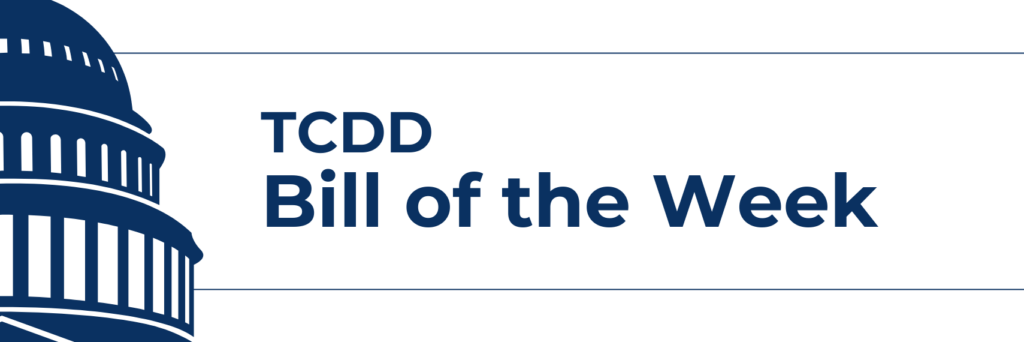
Table of Contents
For this weekly feature, the Texas Council for Developmental Disabilities (TCDD) profiles a noteworthy bill going through the legislative process. The bill may relate directly to TCDD’s Public Policy Priorities or another disability-related issue.
Bill of the Week: SB 66
Senate Bill (SB) 66, relating to a study on authorizing supported decision-making agreements (SDMAs) to include assisting an adult with a disability in legal proceedings. SB 66 was authored by Sen. Judith Zaffirini, from Laredo, Senate District 21.
Share This Bill
We’ve created a Bill of the Week one-pager (PDF) for SB 66. This is a simplified explanation of the bill that you can share with your representative and personal network.
Background
Supported decision-making is an alternative to guardianship that gives people with disabilities support to make decisions without taking away their rights. It is defined in the Texas Estates Code as “a process of supporting and accommodating an adult with a disability to enable the adult to make life decisions, including decisions related to where the adult wants to live, the services, supports, and medical care the adult wants to receive, whom the adult wants to live with, and where the adult wants to work, without impeding the self-determination of the adult.”
An SDMA is a legal document (PDF) for adults with disabilities or those with specific health care needs. An SDMA details the assistance that the individual will need from a supporter. It must be entered into voluntarily, without influence or coercion, and may be terminated by either party at any time.
Texas became the first state in the nation to offer supported decision-making after the passage of SB 1881 in 2015. Since then, nearly two dozen states have enacted a legal framework recognizing SDMAs. Research shared by Disability Rights Texas indicates that adults with disabilities who exercise greater self-determination, including having more opportunities to make decisions about their lives, have improved employment and community participation outcomes, and are better able to resist and avoid abuse.
Sen. Judith Zaffirini authored the 2015 bill that pioneered the use of SDMAs. She stated: “While the program has been successful, persons with SDMAs who are involved in criminal or civil court proceedings have not been permitted to be assisted by their supporters. … This presents a serious concern as the outcomes of such proceedings can have significant and lasting consequences.”
What does the bill do?
SB 66 would require the Office of Court Administration (OCA) of the Texas Judicial System to conduct a study on the legal and ethical implications of authorizing a supporter under an SDMA to assist an adult with a disability in legal proceedings.
The bill specifies that the study must do the following.
- Examine the effect of the supporter’s involvement in civil or criminal legal proceedings on attorney-client privilege and confidentiality. This may include whether the presence of a supporter during legal consultations results in a waiver of privilege or other protection granted under law.
- Identify provisions of the Estates Code and other relevant laws that may require an amendment to provide for the adult’s effective legal support while preserving protected communications and ethical legal representation.
- Evaluate best practices from other jurisdictions that balance the autonomy of adults with disabilities and access to justice with confidentiality safeguards.
- Include recommendations for statutory changes that the office may determine are appropriate based on the results of the study.
In conducting the study, the OCA is authorized to consult with the following entities:
- Disability Rights Texas;
- relevant sections of the State Bar of Texas, including sections specializing in probate, legal ethics, and disability law;
- legal aid organizations and public defenders;
- members of the judiciary; and
- other stakeholders with experience in SDMAs, legal ethics, or disability rights.
If passed, SB 66 would take effect on Sept. 1, 2025. The OCA would be required to submit a report to state leaders detailing the study’s findings and recommendations no later than Dec. 1, 2026.

“I filed Senate Bill 66 to ensure Texans with disabilities can have trusted supporters by their side in criminal and civil legal proceedings. Everyone deserves access to meaningful support when making important decisions, especially in court.”
Sen. Judith Zaffirini, SB 66 author
Where is the bill in the process?
On May 28, 2025, SB 66 was passed by the Texas House in a version different than what was passed by the Senate. Now, the Senate must decide whether to accept the changes made to the bill or request a conference committee to resolve the differences. The Legislature must take final actions on bills no later than Sunday, June 1.
The bill received a public hearing before the Senate Committee on Jurisprudence on April 16. You can watch the discussion on it here, beginning at the 0:24:35 mark.
The bill received a public hearing before the House Subcommittee on Family and Fiduciary Relationships on May 19. You can watch the brief discussion on it here, beginning at the 0:00:45 mark.
Who supports the bill and why?
Two individuals registered their support for SB 66 during the two public hearings held for the bill.
Who opposes the bill and why?
No opposition was registered at either of the bill’s public hearings.
Additional Testimony
The following comments were provided on the bill for the April 16 hearing:
- Disability Rights Texas: Jeff Miller, policy specialist for Disability Rights Texas, testified on the bill. He stated: “Supported decision-making has made a huge impact in the state of Texas, allowing individuals that need a little more support to have someone there to help them understand questions and situations they’re in, understand what their options are, and communicate that to other people.” Miller further suggested “expanding that to civil and criminal matters is a next logical step — and a needed step.” However, he expressed the need to examine the legal and practical implications of such an extension, including matters related to ethics, codes of conduct, attorney-client privilege, and ensuring that a supporter isn’t practicing law or giving legal advice.
Additional Information
Informed by the values identified in the federal Developmental Disabilities Assistance and Bill of Rights Act, TCDD Council Members have adopted the following position statement:
Guardianship and Supported Decision-making: TCDD supports increasing opportunities for and protecting the self-determination and civil rights of people with developmental disabilities. Independent or supported decision-making must be the first and preferred option for people with intellectual and developmental disabilities, including when guardianship is being explored.
TCDD Council Members also adopted the following public policy priority for the 89th Texas Legislature:
Personal and Civil Rights: Increase the protections for the personal and civil rights of Texans with disabilities. Texans with disabilities deserve to understand and exercise their personal and civil rights in order to lead safe and successful lives as independently as possible, and they deserve equal protection when their rights are infringed upon.
How much will the bill cost?
The Legislative Budget Board found that SB 66 would not impact the state budget in a significant way.
Is there a House companion to the bill?
There is no House companion to SB 66.
Stay Informed
For the latest information about where SB 66 is in the process, follow the bill on the Texas Legislature Online. To receive future legislative updates from TCDD, follow us on Facebook, X, Instagram, and LinkedIn.
Bill of the Week Updates
Here is an update on previous TCDD Bills of the Week for the 89th legislative session.
House Bill (HB) 2310 was passed by the Senate on May 25. The bill, which would require the development of a four-year strategic plan to improve access to child care and early childhood education for children with disabilities, now heads to the governor for signature into law.
SB 57 was amended and passed by the House on May 27. Since the two legislative chambers passed different versions of the bill, the Senate must now decide whether to accept the changes or form a conference committee to work out the differences. SB 57 would ensure that public schools have safety plans and accommodations in place for students with disabilities during safety drills, disasters, or emergencies.
SB 568, which would restructure funding for special education programs in public schools, was amended and passed by the House on May 28. A conference committee has been formed to work out the differences between the House and Senate versions of the bill.
